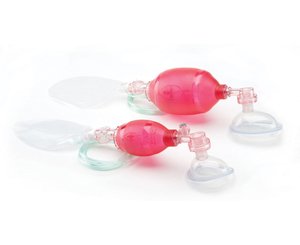o_two
Smart Bag MO Disposable Bag-Valve-Mask (BVM) Resuscitator, Case/6
o_two
Smart Bag MO Disposable Bag-Valve-Mask (BVM) Resuscitator, Case/6
$98.03
MFR# 01BM3200
BP# OTW01BM3200-PNT
The SMART BAG. MO has been designed to allow the provision of consistent ventilations while almost completely eliminating the risks associated with conventional BVM ventilation. The unique actuating mechanism hidden inside the neck bushing of the SMART BAG. MO actually responds to the rescuer and the patient.
By responding to the rescuer’s squeeze and release of the BVM, the SMART BAG. MO limits the excessive flow of gas into the patient’s airway, significantly reducing the risk of gastric insufflation by effectively lowering the airway pressure generated. In a normally compliant and resistant airway, the airway pressure is limited to below the esophageal sphincter opening pressure of 19 cm H2O.
The response by the SMART BAG. MO is proportional to the rescuers squeeze. The harder the squeeze, the greater the greater the restriction to flow. This alerts the rescuer to ease up on the squeeze, reducing the effort required, resulting in the airway pressure being kept to the minimum to achieve adequate ventilation. At no time is the flow of gas into the patient compromised by the SMART BAG. MO, allowing the rescuer to ventilate even the stiffest lung or most restrictive airway.
To assist the rescuer a visual warning of incorrect ventilation technique of the SMART BAG. MO is provided. If the SMART BAG. MO is squeezed too hard, the SMART BAG. MO responds by closing the valve to lower the Flowrate. Should this occur, the “red pressure actuating indicator” moves to the forward position in the neck of the patient valve producing a visual warning of improper technique.
If the patients airway is less compliant or more restrictive (as in patients with COPD or asthma), higher airway pressures will be required to provide adequate ventilation. In responding to this increased pressure required in the patient’s airway, the SMART BAG. MO decreases the resistance to flow from the BVM, balancing the pressure on either side
- Orders are processed upon receipt.
- Most orders are shipped within 24 business hours of receiving your order. We strive to ship your order as soon as possible. No orders are processed or shipped on Saturdays, Sundays or select legal holidays.
- Actual shipping time is dependent on:
- Availability of merchandise
- Weather or natural conditions
- Carrier operating schedules or delays
- Payment processing
- Pharmaceutical authorization if applicable
- In the event of delays, every effort will be made to contact you by phone, e-mail or mail.
- BP Medical Supplies proudly ships to our Armed Forces APO/FPO customers.
- All oxygen cylinders ship empty unless otherwise specified.
- Any shipment that requires refrigeration will require a $6.95 handling fee above regular shipping.
- Items are not guaranteed to be in stock.
- For international orders & shipments, or for more information about shipping & the availability of products, please feel free to contact us.








